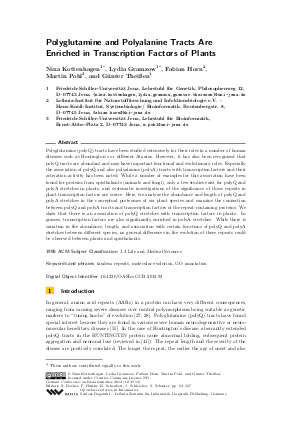Polyglutamine and Polyalanine Tracts Are Enriched in Transcription Factors of Plants
Authors Nina Kottenhagen, Lydia Gramzow, Fabian Horn, Martin Pohl, Günter Theißen
-
Part of:
Volume:
German Conference on Bioinformatics 2012 (GCB 2012)
Part of: Series: Open Access Series in Informatics (OASIcs) - License:
 Creative Commons Attribution-NoDerivs 3.0 Unported license
Creative Commons Attribution-NoDerivs 3.0 Unported license
- Publication Date: 2012-09-13
File

PDF
OASIcs.GCB.2012.93.pdf
- Filesize: 441 kB
- 15 pages
Document Identifiers
Subject Classification
Keywords
- tandem repeats
- molecular evolution
- GO annotation
Metrics
- Access Statistics
-
Total Accesses (updated on a weekly basis)
0PDF Downloads0Metadata Views
Abstract
Polyglutamine (polyQ) tracts have been studied extensively for their roles in a number of human diseases such as Huntington's or different Ataxias. However, it has also been recognized that polyQ tracts are abundant and may have important functional and evolutionary roles. Especially the association of polyQ and also polyalanine (polyA) tracts with transcription factors and their activation activity has been noted. While a number of examples for this association have been found for proteins from opisthokonts (animals and fungi), only a few studies exist for polyQ and polyA stretches in plants, and systematic investigations of the significance of these repeats in plant transcription factors are scarce. Here, we analyze the abundance and length of polyQ and polyA stretches in the conceptual proteomes of six plant species and examine the connection between polyQ and polyA tracts and transcription factors of the repeat-containing proteins. We show that there is an association of polyQ stretches with transcription factors in plants. In grasses, transcription factors are also significantly enriched in polyA stretches. While there is variation in the abundance, length, and association with certain functions of polyQ and polyA stretches between different species, no general differences in the evolution of these repeats could be observed between plants and opisthokonts.
Cite As Get BibTex
Nina Kottenhagen, Lydia Gramzow, Fabian Horn, Martin Pohl, and Günter Theißen. Polyglutamine and Polyalanine Tracts Are Enriched in Transcription Factors of Plants. In German Conference on Bioinformatics 2012. Open Access Series in Informatics (OASIcs), Volume 26, pp. 93-107, Schloss Dagstuhl – Leibniz-Zentrum für Informatik (2012)
https://doi.org/10.4230/OASIcs.GCB.2012.93
BibTex
@InProceedings{kottenhagen_et_al:OASIcs.GCB.2012.93,
author = {Kottenhagen, Nina and Gramzow, Lydia and Horn, Fabian and Pohl, Martin and Thei{\ss}en, G\"{u}nter},
title = {{Polyglutamine and Polyalanine Tracts Are Enriched in Transcription Factors of Plants}},
booktitle = {German Conference on Bioinformatics 2012},
pages = {93--107},
series = {Open Access Series in Informatics (OASIcs)},
ISBN = {978-3-939897-44-6},
ISSN = {2190-6807},
year = {2012},
volume = {26},
editor = {B\"{o}cker, Sebastian and Hufsky, Franziska and Scheubert, Kerstin and Schleicher, Jana and Schuster, Stefan},
publisher = {Schloss Dagstuhl -- Leibniz-Zentrum f{\"u}r Informatik},
address = {Dagstuhl, Germany},
URL = {https://drops.dagstuhl.de/entities/document/10.4230/OASIcs.GCB.2012.93},
URN = {urn:nbn:de:0030-drops-37217},
doi = {10.4230/OASIcs.GCB.2012.93},
annote = {Keywords: tandem repeats, molecular evolution, GO annotation}
}
